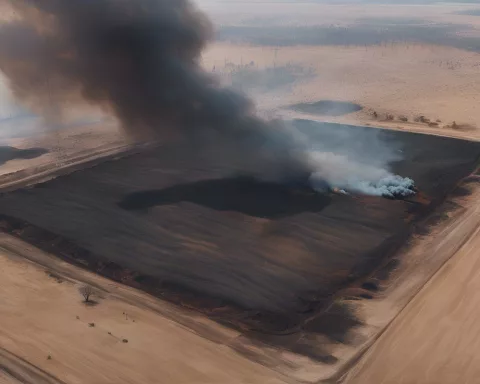The Eastern Cape region in South Africa is facing an unexpected surge in violence related to the taxi industry, with shootings and conflicts escalating. However, the police have increased their efforts to restore peace, resulting in the discovery of 39 illegal firearms in just one week. Criminal proceedings have been initiated against licensed firearm owners who have broken the law, and the government remains firm in its stance against any form of illegal activity related to firearms. While the progress is promising, a societal shift is needed to fully combat the violence.
The Eastern Cape region in South Africa is currently facing a surge in violence related to the taxi industry. The police have increased their operational forces and discovered 39 illegal firearms in just one week. Criminal proceedings have been initiated against licensed firearm owners who contravened the Firearms Control Act. The government has a firm stance against any form of illegal activity related to firearms. While these positive developments herald a promising start in combating the violence, a broader societal shift is necessary.
Eastern Cape, a region renowned for its serenity and picturesque landscapes, is currently grappling with a sudden surge in violence, associated with an industry considered harmless yet crucial – taxi services. Amid the turmoil, the South African Police Service has been actively working to reinstate peace and their endeavours have started bearing significant results.
A Sudden Wave of Violence
Recently, Eastern Cape has seen a drastic increase in taxi-related conflicts, culminating in a number of shooting incidents. Investigations into these incidents have led the authorities to infer that the violence is deeply rooted in a more malicious network of taxi aggression.
In response to this abrupt surge in crime, the provincial police management has significantly increased its operational forces. Specialized units such as the National Intervention Unit have been dispatched to the districts most affected by these violent episodes. The effect of these strategic deployments has been clearly noticeable.
In the span of a single week, the forces have discovered 39 illegal firearms during their operations. These unlawful weapons include AK assault rifles, R5 rifles, shotguns, and pistols, indicating the severity of the current situation. Thanks to the police’s relentless efforts, 17 individuals have been arrested for possessing illegal firearms, and another 90 suspects have been detained for carrying unlicensed ammunition.
A Firm Crackdown on Unlawful Activities
In order to maintain the law and order, authorities have initiated criminal proceedings against 22 licensed firearm owners who contravened the Firearms Control Act. This action clearly demonstrates the government’s firm stance against any form of illegal activity related to firearms.
Among the arrested individuals, one stands out – a 41-year-old taxi owner. This man, involved in cases pertaining to taxi violence, extortion, murders, and robberies, was arrested in the Amathole District extending beyond the Eastern Cape Province. His capture sheds light on a deeper level of corruption, suggesting that criminal activities are intricately linked to the taxi industry in the area.
The suspect was apprehended while driving a Mercedes Benz, equipped with an AK-47 rifle, two fully-loaded magazines, and several live ammunition rounds for an R5 rifle. This vast collection of weapons places him at the epicentre of the ongoing violence.
As the suspect awaits his trial in the Idutywa Magistrate’s Court on charges of possession of unlicensed firearms and ammunition, more charges may be added as the investigation progresses, revealing a wider extent of his involvement in the increasing violence.
An Ongoing Investigation
As the authorities continue to probe into the crisis, layers of complexity are being unveiled. Private security companies are now under investigation for their potential involvement in the taxi conflict, further highlighting the extent of this problem.
While these positive developments herald a promising start in combating the violence, Lieutenant General Nomthetheleli Mene, the provincial commissioner, stresses the need for a broader societal shift. Mene urges leaders of taxi associations to participate in constructive dialogue to resolve their disagreements and halt the carnage.
A Tale of Corruption and Hope
This ongoing saga in the Eastern Cape serves as a poignant reminder of the intricate socio-economic dynamics that shape everyday services such as public transportation. The intermingling of criminal activities with the taxi industry shines a light on the depth of corruption and crime that can hide beneath the surface of societal norms. However, the relentless efforts of the South African Police Service provide a beacon of hope, promising a return to peace in a region wrestling with unforeseen discord.
1. What is the cause of the surge in violence in Eastern Cape?
The surge in violence in Eastern Cape is related to the taxi industry, with conflicts and shootings escalating.
2. What action has the police taken to address the violence?
The police have increased their operational forces and deployed specialized units to districts most affected by the violent episodes. In just one week, they have discovered 39 illegal firearms and arrested 17 individuals for possessing them.
3. What is the government’s stance on illegal activity related to firearms?
The government has a firm stance against any form of illegal activity related to firearms and has initiated criminal proceedings against licensed firearm owners who have broken the law.
4. Who was the 41-year-old taxi owner arrested and what was he charged with?
The 41-year-old taxi owner was arrested for possessing an AK-47 rifle, two fully-loaded magazines, and several live ammunition rounds for an R5 rifle. He was charged with possession of unlicensed firearms and ammunition, and may face additional charges as the investigation progresses.
5. What is the broader societal shift needed to combat the violence?
According to Lieutenant General Nomthetheleli Mene, the provincial commissioner, a broader societal shift is needed, and taxi associations need to participate in constructive dialogue to resolve their disagreements and halt the carnage.
6. What does the ongoing saga in Eastern Cape highlight?
The ongoing saga in Eastern Cape highlights the intricate socio-economic dynamics that shape everyday services such as public transportation. It also shines a light on the depth of corruption and crime that can hide beneath the surface of societal norms, but the relentless efforts of the South African Police Service provide a beacon of hope, promising a return to peace in the region.












